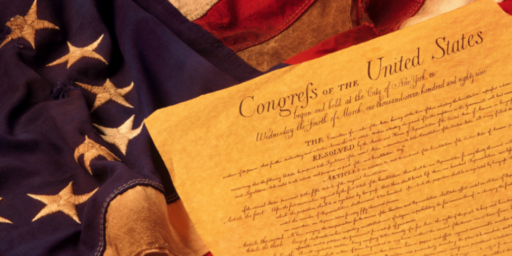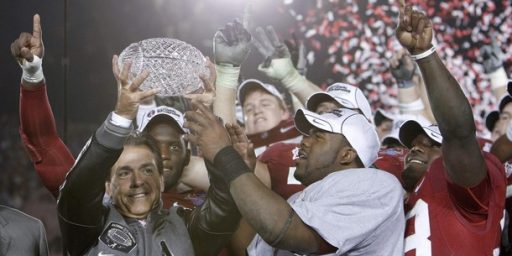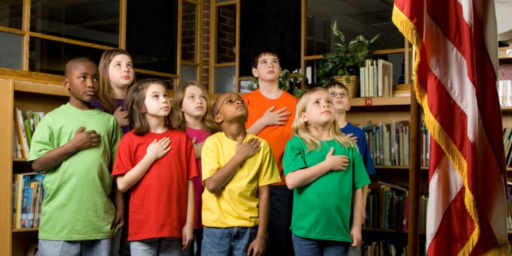Supreme Court Debates ‘Bong Hits 4 Jesus’
The High Court lived up to its nickname yesterday during oral arguments in a case about whether high school students have a free speech right to hold up ungrammatical banners, off school grounds, which possibly advocate marijuana use. The Justices were having a good time, as is WaPo’s Dana Milbank.
As Ken Starr told the nine justices yesterday why a student’s “Bong Hits 4 Jesus” banner didn’t qualify as free speech, the whole bunch of them sounded one toke over the line.
“So if the sign had been ‘Bong Stinks for Jesus,’ that would be . . . a protected right?” asked Ruth Bader Ginsburg.
“Suppose that this particular person had whispered to his next-door neighbor, ‘Bong hits for Jesus, heh, heh, heh’?” contributed Stephen Breyer.
“What if the sign said ‘Bong Hits Should be Legal’?” queried John Paul Stevens.
Anthony Kennedy got really psychedelic. “Suppose the banner said ‘Vote Republican’?”
David Souter inhaled. Imagine, he said, that the student “just holds a little sign in the Shakespeare class that says ‘Bong Hits 4 Jesus’ . . . and they say, ‘Well, so-and-so has got his bong sign again.’ They then return to ‘Macbeth.’ ”
Far out. Antonin Scalia wanted a turn. “Smoke Pot, It’s Fun,” he proposed.
“‘Rape Is Fun’?” offered Kennedy.
“‘Extortion Is Profitable’?” Scalia rejoined.
All that was missing in the chamber yesterday was black light and Bob Marley. And to think Douglas Ginsburg withdrew his nomination to the high court because he had used marijuana.
While oral arguments don’t always foreshadow the ruling, it doesn’t appear that any of the Justices took Starr’s arguments seriously. Which strikes me as a good thing.
UPDATE: Slate‘s Dahlia Lithwick has an excellent piece on the subject which, unfortunately, makes it seem that some Justices are far more sympathetic to the “schools can stifle speech” argument. On the other hand, she’s dead right in implying that the aggrieved student here is no free speech hero.
We’ve come a long way since “Fuck the Draft.” The history of free speech in America features a long proud march of embattled speakers pushing back against government authority. Whereas today’s free-speech heroes pretty much just want to be zany enough for YouTube.
In the old days, whether they were claiming that government workers were “God damned racketeers” (in Chaplinsky v. New Hampshire); protesting the war in Vietnam with armbands (Tinker v. Des Moines) or foul words (Cohen v. California); declining to “live free or die” (Wooley v. Maynard) or asserting the controversial right to burn a flag (Texas v. Johnson) these folks had the courage of their convictions. And because of John and Mary Beth Tinker—who wore black armbands to school to protest the war—the Supreme Court once agreed that student free-speech rights don’t disappear at the schoolhouse gate. Today’s court isn’t so certain.
Alaska high-school student Joseph Frederick hoisted his 14-foot “Bong hits 4 Jesus” banner to get on TV. He knew it was a meaningless phrase. He’d seen it on a snowboard. (Nine out of 10 potheads I polled for this piece confirmed these words are no more meaningful when stoned.) But Frederick wanted to annoy school administrators, and he wanted media attention, and as we discovered today, he chose well on both fronts. He was suspended for 10 days. And we are out in droves to cover his case. The words “Bong Hits 4 Jesus” do grab headlines, and even the justices seem to be giggling and getting the munchies as they speak the words this morning.
Certainly, all indications are that this was a lark rather than a real attempt to speak out on an issue of public policy. My understanding of SCOTUS precedents on these matters is that this distinction matters, since political speech carries the strongest presumption of First Amendment protection.
Linda Greenhouse, the NYT’s superb legal correspondent is characteristically less glib.
A majority of the court seemed willing to create what would amount to a drug exception to students’ First Amendment rights, much as the court has in recent years permitted widespread drug testing of students, even those not personally suspected of using drugs, under a relaxed view of the Fourth Amendment prohibition against unreasonable searches.
Mr. Starr’s biggest ally on the court was the man who once worked as his deputy in the solicitor general’s office, Chief Justice John G. Roberts Jr. The chief justice intervened frequently throughout both sides of the argument, making clear his view that schools need not tolerate student expression that undermines what they define as their educational mission. “Why is it that the classroom ought to be a forum for political debate simply because the students want to put that on their agenda?” Chief Justice Roberts asked Mr. Starr.
There’s no question as to whether teachers have the right to stifle student speech in the classroom. The speech in question, however, took place off school grounds while the student was not in control of school authorities. (He was, however, truant.)
One issue in this case, Morse v. Frederick, No. 06-278, was the nature of the event at which the student unfurled his provocative banner. Edwin S. Kneedler, a deputy solicitor general who shared Mr. Starr’s argument time and presented the Bush administration’s position in support of the school, said the torch event was the equivalent of a school assembly, with students attending under their teachers’ supervision and under the school’s jurisdiction.
Mr. Mertz said it was basically a public event in a public place. In that context, he argued, the sign was not disruptive. The distinction matters, because under the Tinker precedent, student speech can lose its protected status if it is unduly disruptive.
Justice Anthony M. Kennedy took issue with Mr. Mertz’s characterization of the display as not being disruptive. “It was completely disruptive of the message, of the theme that the school wanted to promote,” Justice Kennedy said, adding: “Completely disruptive of the reason for letting the students out to begin with. Completely disruptive of the school’s image that they wanted to portray in sponsoring the Olympics.”
So what? The school doesn’t have a right to present an unchallenged message. It only has a right to exercise a reasonable amount of control of students under its supervision at the time. Students who have left school grounds would seem definitionally outside that.
During the argument, Justice Alito interrupted Mr. Kneedler as the deputy solicitor general was asserting that a school “does not have to tolerate a message that is inconsistent” with is basic educational mission. “I find that a very, very disturbing argument,” Justice Alito said, “because schools have defined their educational mission so broadly that they can suppress all sorts of political speech and speech expressing fundamental values of the students under the banner of getting rid of speech that’s inconsistent with educational missions.”
In response, Mr. Kneedler said that for that reason, “it would make a lot of sense” for the court to issue a narrow ruling limited to student advocacy of illegal conduct in general or drug use in particular.
Then, it’s not a limit on disruptive behavior but on the particular content of speech. Even allowing that minors have less protection in this regard than adults, I don’t see how that’s permissible.
UPDATE: Schoolteacher Betsy Newmark finds this troubling as well.
I’m all for giving deference to administrators. I don’t want courts having to decide what was an acceptable and not acceptable. Allowing principals to bar speech advocating breaking the law seems quite reasonable. What troubles me is that the kid was punished for something that he held up outside of school. Even if it is across the street, I don’t think that a principal should be able to suspend a student for what he does off school property even if he was just across the street. If he’d unfurled his banner in school, he could have gotten in trouble if his banner had interfered with a particular class focusing on the day’s lesson or if he’d blocked traffic in the hall. If he’d held up his banner across the town from the school, the principal wouldn’t have been able to suspend him. Are we now going to draw a zone of authority around a school, extending beyond the physical land of the school, where principals can bar expressions of free speech?
What strikes me especially odd, leaving aside Constitutional debate for a moment, is that the principal would almost certainly have had the power to suspend Frederick for skipping school. Why did he choose to instead do it on the pretext of disruptive speech?
On the other hand, Lyle Dennison points to an interesting side-debate as to whether the principal should be liable for damages:
Sounding somewhat frustrated, Justice David H. Souter remarked near the end of the hearing: “We have had a debate here for going on 50 minutes about what Tinker means, about the proper characterization of the behavior, the non-speech behavior. The school’s terms in dealing with the kids that morning. The meaning of…the statement. We’ve been debating this in this courtroom for going on an hour, and it seems to me…there is reasonable debate.” Thus, Souter said, perhaps the school principal may not have known, at the time of the incident, what the correct view of the law was.
That was a clear indication that the Court may well be tempted to find that Principal Morse could not be charged with knowledge, back in 2002, of what exactly her official discretion was under the Tinker doctrine, and thus might be accorded legal immunity, at least to damages claims.
The Chief Justice reinforced that point with an expression of concern that, not only might a decision in the student’s favor mean that Principal Morse would “have to pay out of her own pocket” money damages that Frederick might yet win, but it also might mean that “principals and teachers around the country have to fear that they’re going to have to pay out of their personal pocket whenever they take actions pursuant to established board policies that they think are necessary to promote the school’s educational mission.”
A reasonable concern. I don’t know what the law is on such things but it strikes me as reasonable to exempt officials from financial liability unless their conduct is egregious.






Not being up on this area of the law, I am COMPLETELY mystified why school authorities have any right to punish a student for off-campus conduct, let alone off-campus *speech*.
At some point, financial liability for either the district or the official makes sense.
Suppose the principal had suspended the kid b/c he saw the kid *in the mall* with a “Bong Hits 4 Jesus” T-shirt on.
At some point, the conduct becomes arbitary and unjust, and damages are proper. It would be nice if the Court would draw a line so we know where that point is.
As it stands, I am a little suspicious that they’re keeping the line vague SO THAT officials will never be held personally accountable.
Haven’t we already drawn a zone around schools preventing firearms inside that zone. Last I checked, the right to carry a firearm is a constitutional right. Seems to me, a “no free speech zone” around schools could very well fall into the same catagory.
Seems to me, a “no free speech zone†around schools could very well fall into the same catagory.
Congress passed the Gun Free School Zones Act in 1990. The Supreme Court struck it down in U.S. v. Lopez (1995).
Horsepuckey. This is just another round of “in my day we stood for something, but kids these days…”
It’s utter crap. The phrase “bong hits 4 jesus” has a perfectly understandable meaning- it’s satire. It invokes the image of the hippy-esque Jesus smoking ganja with his 12 freinds, talking about how to solve all the world’s problems. This is in stark contrast to the corporate preened jesus that is presented buy the religious right, in which Jesus’s prime concern is the capital gains tax and how it hurts wealthy white people.
I don’t think a school should be able to punish a child for acts outside of the school’s control.
And even it for some reason the schoo could do this, I am appalled that a student was given a suspension for it-this was a practical joke that harmed no one, at most it warranted a detention. The truancy may have deserved some punishment, but even then 10 days for truancy is excessive as well.
Maybe the kid should claim he left off part of the sign. It should have said, “Bong Hits 4, Jesus 9.”
Free speech has never been “free”. Words can harm or heal.They bear consequences.